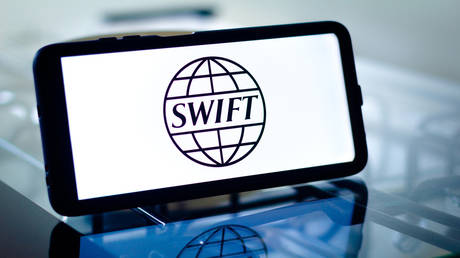
Russia and Iran ditch SWIFT
The sanctioned countries no longer need the Western system for transactions, says the deputy head of the Central Bank of Iran
Iran and Russia have officially switched from the West’s SWIFT system to a direct interbank transfers mechanism, the deputy head of the Central Bank of Iran (CBI) has said.
Mohsen Karimi told Iranian state television on Sunday that the system allows companies in both countries to trade in their respective national currencies instead of using the dollar or euro, FARS news agency reported.
“We have linked the financial correspondence networks of the two countries,” he explained.
“This means that the banks of our two countries no longer need Switzerland to communicate with each other and commercial banks of both countries can establish brokerage relations with each other. The [Iranian] exporter can now charge the Russian side in rials and receive money from them via Russian banks in Iran,” Karimi added, noting that the system also allows for payments in Russian rubles.
Belgium-based SWIFT is a high-security banking messaging system that enables financial transfers around the globe. While a number of countries have their own messaging systems, most global transactions are still conducted via SWIFT. Last year, key Russian banks were disconnected from the network as part of sanctions related to the Ukraine conflict.
Western restrictions forced Russia to actively promote its domestic payment system, SPFS, as an alternative to SWIFT. The mechanism was first introduced when the US targeted the country with sanctions in 2014. The system, which facilitates the transfer of financial messages between banks both inside and outside the country, had 514 participants, including 131 foreign entities from 15 nations, as of the first half of last year.
READ MORE: Russia may switch to rubles in trade with Italy
Iran and Russia have both been targeted by Western sanctions. They first announced plans to scrap Western currencies from mutual settlements and use alternative financial systems in trade in 2022. During a meeting between the heads of their central banks late last month, Tehran and Moscow signed an agreement that formalized this aspiration.
For more stories on economy & finance visit RT’s business section

